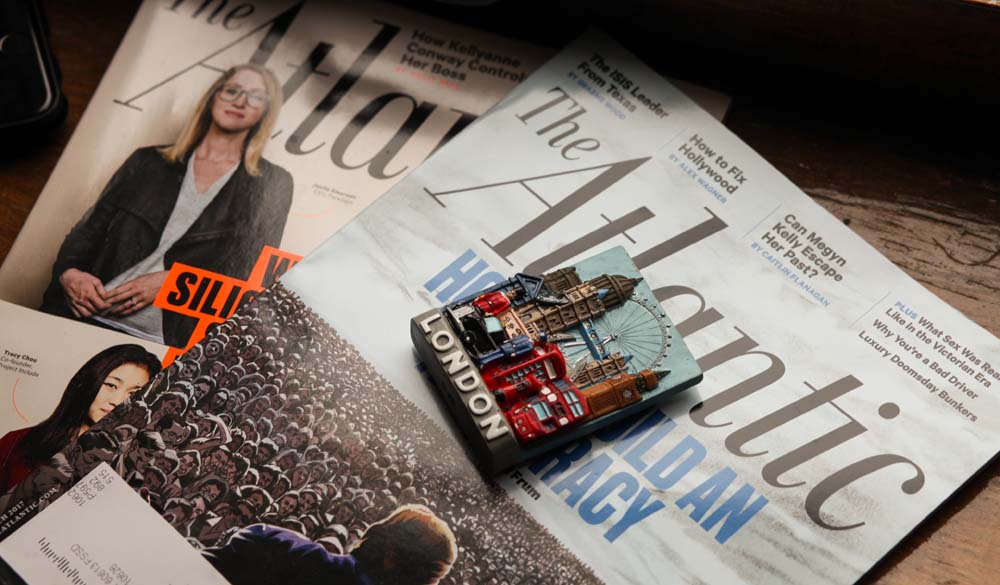At the time when the world’s attention is focused on Donald Trump and the United States, The Atlantic is turning its attention overseas.
The magazine announced on Monday morning plans to open its first London bureau, led by longtime Atlantic veteran James Fallows, who will become the magazine’s first Europe Editor. The Atlantic plans to fill the office with 10 staffers across its editorial and business teams, which will be charged with building up both sides of The Atlantic’s operation — including live events — on the continent.
Bob Cohn, The Atlantic’s president, said the magazine’s mission won’t change with the expansion: “We’re still setting out to bring clarity and original thinking to the most significant issues of the day. There’s an opportunity and a responsibility for us to do that on a more global stage.” He pointed out that The Atlantic is building on an audience that it’s already developed overseas: TheAtlantic.com already gets more than a quarter of its 33 million unique monthly web visitors from outside the U.S, a number it hopes to grow and convert to new revenue opportunities in Europe and elsewhere.
While many of the details are still up in the air (Fallows won’t move until summer), I spoke with Cohn about The Atlantic’s editorial and business ambitions for the move, as well as where the timing of the move fits into some of the recent political developments in the U.S. and abroad.
Ricardo Bilton: Here’s a dumb question with an obvious answer, given his resume, but: Why pick James Fallows to lead this?
Bob Cohn: Because Jim understands The Atlantic better than anyone, having been here more than four decades. He’s one of the premier journalists in America who has an omnivorous approach to all subjects. He can write about global affairs and software and American politics and craft beer with equal enthusiasm and expertise. The combination of his experience and his passion and his knowledge and his understanding of The Atlantic makes him the obvious choice. Frankly, I’m thrilled that he and his wife Deborah want to do it.
Bilton: I’m interested in the timing of this. Why make this investment abroad when, since the election, so much of the global attention has been focused on what’s happening in the U.S.?
Cohn: We started talking about doing this about a year ago, but we had to wait for the current budget cycle to do it, given what for us is a very ambitious effort. Donald Trump was in the news as a Republican vying for the nomination, but he wasn’t yet the nominee, let alone the president, when we decided to do this.
But two things have happened that make this move auspicious: One, Trump is either a reflection of or an early warning sign of this global nationalism we’re seeing across Europe. So that makes the story not just more interesting but more tied to what’s happening in America at the same time. Also, in the Trump administration, the relationships between the U.S. and its western European allies has never been more interesting, at least in the last few decades, than it might be right now.
At the same time, there’s this huge demand overseas to understand what’s happening in Washington. We think there’s an opportunity to expand our audience beyond the organic levels they’ve reached so far. We have a decent-sized audience overseas despite the fact we haven’t really tried to do something there. But there’s an opportunity to expand that because there’s an appetite to understand America at this critical juncture. I see this as a chance to bring coverage of what’s happening in America to a large global audience, but also to bring an understanding of what’s happening around the world the American audience that we already largely serve. By having more staff writers overseas we’ll be able to satisfy that demand and obligation.
Bilton: Is the priority to cover Europe for Americans or Europe for Europeans?
Cohn: We’re going to do both. We’re going to have maybe a half dozen reporters there. We think that their output will be equally appealing to our large and growing America-based audience and to our somewhat smaller but hopefully faster-growing European audience. We want to cover Brexit, or the next Brexit, for American readers and also for European readers.
Bilton: Beyond the rise-of-nationalism story, which is a big one that a lot of people on both sides of the Atlantic are following, what are the other stories that you think are going to be core the coverage there?
Cohn: The U.S.-European relationship is going to be important. Migration and national security and terrorism are going to be important stories as well. We’ve seen it in London and we’ve seen it in Paris. These are stories that matter globally and matter to American readers. The way we’re all knit together economically means that covering the global economy is more important than ever. There’s a lot out there for us. We’re not on the ground there yet, but Jim probably has at least 10 more stories in his head as well.
Bilton: So we’ve been talking about the editorial side. What’s the business opportunity you see there?
Cohn: We’re serving 10 million unique visitors outside the U.S. We are sourcing nearly all of our advertising from the U.S., yet we have this large non-U.S. audience. We think that there is a large opportunity in bringing in London and Europe to source more advertising and work with more marketing partners and bring our trademark native advertising work to these markets. The same goes for our events, a few of which we’ve already done in Europe. We’re going to be aggressive about that as well.
